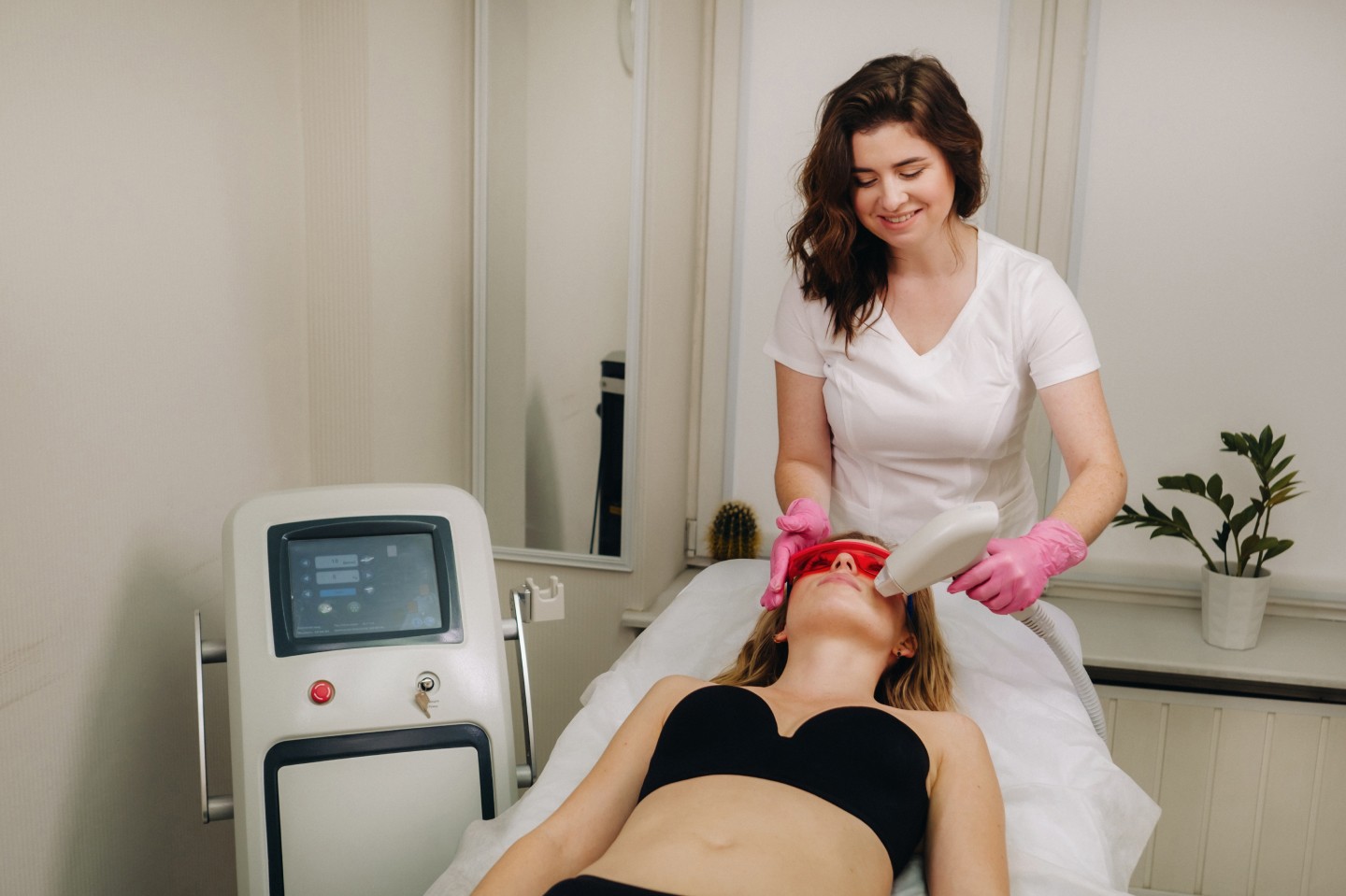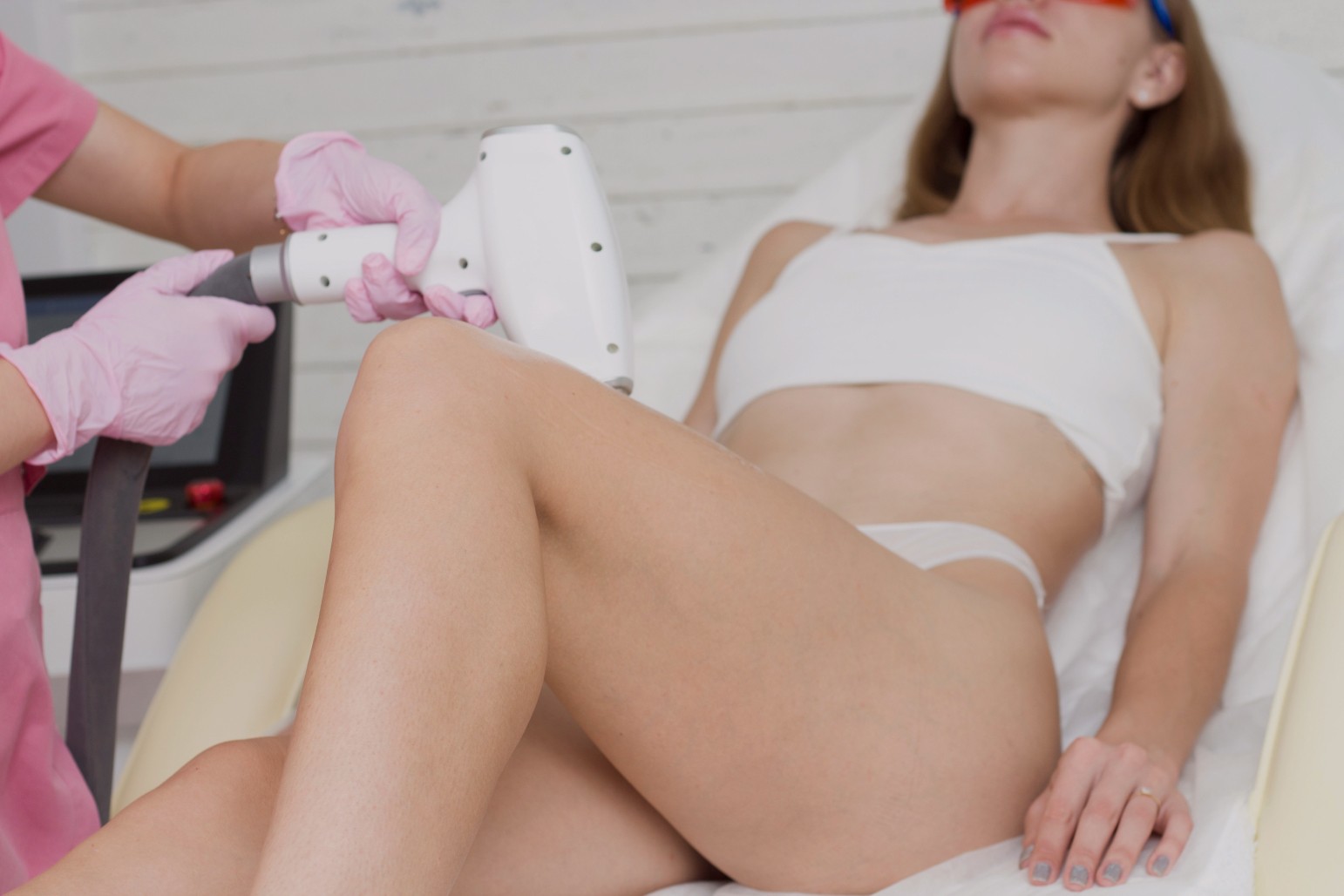Laser hair removal is undoubtedly the most effective way to permanently get rid of unwanted hair. And despite its effectiveness, it is also considered very safe. However, under what circumstances is it not recommended to undergo the procedure, and what can happen if you neglect your specialist’s instructions? Let’s take a look at the risks of laser hair removal and how to prevent them.
Obsah
But don’t let concerns about risks deter you from your procedure. Laser hair removal is among the safest and gentlest methods of hair removal. And no other method can match the longevity of its results. Schedule your hair removal appointment right away!
Risks and side effects of laser hair removal
Like anything in the world, even laser hair removal is not completely without risk. However, it is true that these risks and side effects are minimal in the vast majority of cases, with no serious impacts on your health. That doesn’t mean they aren’t annoying and unpleasant.
The most common side effects of laser hair removal include:
Incomplete hair removal
A botched or incomplete hair removal session is a risk with any procedure, and while it doesn't have any impact on overall health, disappointed expectations are certainly an unpleasant experience in their own right.
There can be multiple reasons why the hair removal didn't succeed completely. On one hand, it could be due to the inexperienced work of the specialist, or the laser itself may be defective, outdated, or inadequate.
The fault could also lie with the client, who may not have followed all the preparation and post-care instructions provided by the specialist. Some clients may also skip the full number of recommended hair removal sessions, which naturally leads to incomplete hair removal.
However, sometimes neither the specialist nor the client is at fault. The regrowth of hair can be caused by hormonal fluctuations, certain illnesses, or medications.
Redness and swelling - common side effects of laser treatment
Redness and swelling are among the most common side effects of laser hair removal and usually affect clients with more sensitive skin. The skin reacts naturally to the intense energy of the laser beam.
Typically, redness and swelling are only temporary, often subsiding on the same day, though they can occasionally last up to three days. They are usually not accompanied by any significant pain. You can address them with a cold compress or a special soothing gel.
If redness and swelling persist for an extended period, it is advisable to consult a dermatologist. However, such cases are indeed rare.
Hyperpigmentation
Hyperpigmentation results in unsightly dark spots on the skin.
Laser hair removal generally does not cause hyperpigmentation. However, it can occur if you expose freshly treated skin to strong sunlight unnecessarily. Sometimes, hyperpigmentation can also develop due to visits to tanning beds, saunas, or hot baths during the time when the skin should be resting after the procedure.
To minimize the risk of hyperpigmentation, avoid sun exposure on the treated areas after the procedure, and if you must be in the sun, use a high SPF sunscreen.
Pain during the procedure
Laser hair removal does not have a reputation for being a particularly painful procedure. This is especially true if you are treated with some of the newer lasers, which are more precise and often equipped with built-in cooling systems.
Nevertheless, the procedure may not be particularly pleasant for individuals with a low pain threshold, and it can be accompanied by uncomfortable stinging sensations. Therefore, many salons offer clients a local anesthetic in the form of a special cream. With this, the procedure is manageable.
Keep in mind that more drastic methods, such as waxing, are much more painful! They also won’t perfectly protect you against ingrown hairs and other issues associated with repeated shaving.
Burns and scars
In a truly professional salon, this should never happen, and if it does, it indicates a significant error on the part of your specialist.
Burns and scars can occur due to improperly set machine intensity or the use of low-quality or outdated lasers.
An inexperienced specialist may also hold the laser on one spot for too long, causing damage to the skin. Additionally, they might improperly adjust the laser according to your skin and hair type.
Scarring and burns can also occur if you undergo subsequent sessions before your skin has healed and calmed down from the previous treatment.
Rarely, these complications may arise due to neglected aftercare following the procedure.

Am I at risk of cancer after the procedure? We clarify the myths surrounding laser hair removal
In one word: No. Laser radiation is non-ionizing and cannot cause changes at the DNA level that could lead to cancer.
During the procedure, the laser beam transforms into thermal energy upon contact with the hair, penetrating only a few millimeters into the skin and destroying the hair follicle.
This energy has no carcinogenic potential, and the worst that can happen with improper laser handling is localized burning. There has never been any proven connection between hair removal and cancer.
That used to be true. The first lasers required a high contrast between the skin and hair; they were most effective on light, minimally pigmented skin and, conversely, on dark, heavily pigmented hair.
However, today’s medical-grade laser technologies—whether alexandrite, diode, or Nd
lasers—are advanced enough and much more powerful, allowing them to effectively treat any skin type, including light, minimally pigmented hair.
Laser hair removal can be performed safely in any season.
However, it is true that if you excessively expose freshly treated skin to sunlight, you run the risk of hyperpigmentation.
For this reason, many people choose to schedule their procedures in the fall and winter months, although it can be done at any time if proper precautions and all instructions from your specialist are followed. So, there is no need to fear summer treatments.
On the contrary, laser hair removal can safely treat any part of the body, including intimate areas.
In fact, it should often be the first choice for sensitive spots, as opposed to painful waxing or potentially harmful chemical depilatory creams.
There is no proven immediate harm of laser hair removal during pregnancy. However, it is generally not recommended for pregnant women to undergo this somewhat unusual procedure, as there could be even a negligible risk to both the fetus and the mother.
During pregnancy, the body undergoes numerous hormonal changes, which could lead to unusual reactions to laser hair removal. Although the chance is low, it is always advisable to postpone hair removal until after your baby is born.
How to minimize the risks of laser hair removal?
Choose a good salon
The quality of the salon is crucial for successful hair removal. You should choose a facility where qualified and certified specialists work.
Also, find out more about the type of laser the salon uses, whether it is a medical device, and what reviews it has received. As always, client reviews of the laser hair removal service at that location can be very helpful.
Make the most of your consultation
Most reputable salons offer a no-obligation consultation before the procedure, which you should take advantage of. Often, the specialist will also offer a trial treatment on a small area of your body to help ease any fears you might have about the procedure and to demonstrate that it works.
Be aware of contraindications
During your pre-treatment consultation, the specialist should discuss any potential contraindications that may prevent you from undergoing the procedure.
Such contraindications include, among others, pregnancy, oncological diseases, various skin conditions, epilepsy, blood clotting disorders, infectious diseases, taking certain medications, and more.
Pre-epilating care
It’s important not to neglect preparation before the epilation. Typically, this means not removing hair by any method other than traditional shaving for at least a month before the procedure. The day before epilation, it’s advisable to shave the skin smoothly.
Epilation is not suitable for freshly tanned skin, which should be at least a week old. Therefore, avoid sunbathing before the procedure.
The epilation should be performed on clean skin, free of makeup or various creams.
Post-epilating care
The proper care after epilation often determines its results. Therefore, follow these steps:
- Mild irritation and redness of the skin immediately after the procedure are common and can be addressed with cooling compresses or soothing creams containing aloe vera and similar ingredients.
- For at least two weeks after epilation, avoid direct sunlight on the treated area and use a high SPF sunscreen.
- Keep your skin hydrated with gentle, fragrance-free moisturizers.
- For several days, avoid hot baths, saunas, and excessively hot showers.
- Intensive exercise and strenuous activities are also not recommended for one to two days after the procedure.
- Do not scratch your skin! While it is healing, avoid irritating it with other hair removal methods—laser epilation will take care of all of them at the right time!





